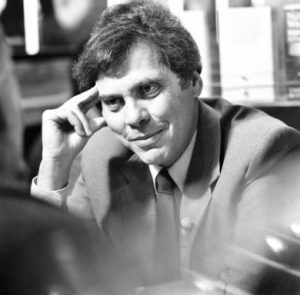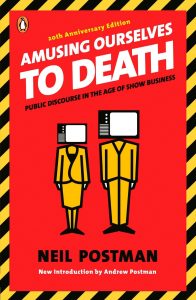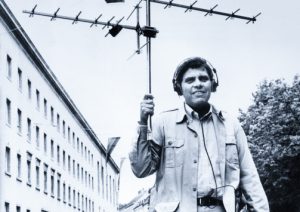Ellul and Postman
Media and Culture: Jacques Ellul and Neil Postman
by Geri Forsberg, 2021
“Postman educated the populace on the ways we are “amusing ourselves to death,” on the ways childhood is disappearing, on the dangers of technocracy, and the ways our educational system is being eroded.”
 Two of the most influential social critics of the twentieth century were Jacques Ellul (1912-1994) and Neil Postman (1931-2003). These two prophetic communication scholars are even more relevant in our twenty-first century political and social environment. This article will identify some of the similarities between these two authors and a few of the places they diverged with the hope that these principles can inform our own thinking about media, technology, and culture.
Two of the most influential social critics of the twentieth century were Jacques Ellul (1912-1994) and Neil Postman (1931-2003). These two prophetic communication scholars are even more relevant in our twenty-first century political and social environment. This article will identify some of the similarities between these two authors and a few of the places they diverged with the hope that these principles can inform our own thinking about media, technology, and culture.
Jacques Ellul was a French sociologist, professor, lay pastor, and philosopher of technology, propaganda, and language. He wrote over 50 books and over a thousand articles. His books and articles are still being translated from French into English and other languages.(1) He is most well known in communication studies for his work on The Technological Society (1964) and Propaganda (1973).
Neil Postman, on the other hand, was an American social and media critic. Postman began his career as an English professor after receiving his doctorate from Columbia College in New York City. Postman began the first doctoral program in Media Ecology at New York University.(2) Postman’s early work focused on linguistics and English education. As his career developed, he came to understand that all our media are our languages. As languages, the media condition the way we view the world, what we think and what we fail to think about. The media influences every aspect of our lives—spiritually, physically, emotionally, psychologically, socially—everything is affected by the media and technology.
As we consider these two social critics, it is apparent that there are many media ecology ideas that they held in common. Here are seven ideas that Ellul and Postman shared.
First, like the communication scholar Marshall McLuhan, both Ellul and Postman knew that the medium is the message.(3) They both understood that technology and media are not neutral; structurally they have inherent biases. Television, for example, is biased toward images. Television culture creates a very different environment for us than a print-based culture. A print-based culture tends to create linear thinking, fosters rationality and logic, and supports analysis and historical reflection. The television culture, in contrast, promotes emotional thinking and present-oriented thinking. Postman believed that as we are immersed in the television culture, we are “amusing ourselves to death.”(4) Not only did Ellul and Postman realize that the medium is the message; they also understood McLuhan’s clever adaptation: the medium is the massage.”(5)
All media work us over completely. They are so pervasive in their personal, political, economic, aesthetic, psychological, moral, ethical, and social consequences that they leave no part of us untouched, unaffected, unaltered. The medium is the massage. Any understanding of social and cultural change is impossible without a knowledge of the way media work as environments.(6)
Ellul and Postman both agreed that the structure of media and technology are changing us even more than the content of the media.
Second, Ellul and Postman understood technology and media to be determining factors in culture. Ellul shifted thinking away from the economy as the decisive social factor (i.e. Marx) to technique as the dominant and controlling element of culture. In The Technological Society, Ellul described how society is controlled by techniques and technology. In The Disappearance of Childhood (1982), Postman illustrated and explained how this happens. He used the concept of childhood as an example. He described childhood in an oral culture during the Middle Ages, childhood during the print age after the development of Johannes Gutenberg’s printing press, and finally, childhood in an image-based television culture. Postman argues that in our contemporary television culture, the nature of what we had come to understand as childhood—a special time, a time of innocence where children were shielded from war, sex, horrific crime, and other adult matters, a time of sequential human development—has all but disappeared. Because of television and social media, children are exposed to every form of human degradation. Furthermore, we are seeing the breakdown of linear thought, rationality, logic, sequential learning, and educational hierarchies. Both Postman and Ellul knew that technology is radically changing culture.
Third, Ellul and Postman both understood that our media and technologies change our environment. When we add a new technology, we no longer have the old society plus the new technology; we have an entirely new environment. As Postman stated, “Technological change is not additive; it is ecological. A new technology does not merely add something; it changes everything.”(7) Postman described it like adding food coloring to a glass of water. You no longer have the same glass of water plus the food coloring. The food coloring disperses and permeates the entire glass of water. Whenever you add a new element, you create a new environment. Anyone who adds a new child, a kitten, a puppy, to their household knows that you no longer have the old environment. Everything in your household changes. The same ha ppens with technologies. When the iPhone was adopted, we no longer had the same cultural environment; the iPhone permeated all environments and changed them. Schools, planes, homes, doctor’s offices, businesses, indeed, all social realms, have all changed because of this new technology. Ellul and Postman both alerted us to the ways technologies abolish old environments and create new ones.
ppens with technologies. When the iPhone was adopted, we no longer had the same cultural environment; the iPhone permeated all environments and changed them. Schools, planes, homes, doctor’s offices, businesses, indeed, all social realms, have all changed because of this new technology. Ellul and Postman both alerted us to the ways technologies abolish old environments and create new ones.
Fourth, Ellul and Postman recognized certain principles about technology. Some of these principles were outlined in Ellul’s book The Technological Bluff (1990). For example, according to Ellul, “All technological progress has a price.”(8) Technology both gives and takes away. It can help us, but it can also harm us. Postman explained that technology is a “Faustian bargain.”(9) There is a tradeoff. We accept what it has to offer, but in the meantime, we can lose some of the things that are important for life. For instance, we accept the new Zoom technology because it has enabled us to conduct classes, attend conferences, go to church, and meet up with people, all in the convenience of our homes. But, in the process, we are losing out on face-to-face time with others. People, today, are experiencing more loneliness, depression, anxiety, and isolation than ever before. There is a price we pay for every technology.
Ellul believed that technical progress “raises more and greater problems than it solves.”(10) Postman would agree. One of the greatest problems we are currently faced with is the lack of privacy in our surveillance society. Every move we make is being tracked and recorded. We have accepted technological progress, but in the process, we have lost our peace. Furthermore, we have lost our moral foundations, our sense of judgment, our common sense, our understanding and appreciation of history, and our basic sense of loyalty. Ultimately, we have lost a knowledge of the Holy. In his book, Technopoly (1992), Postman argues that in a totalitarian technocracy “there can be no transcendent sense of purpose or meaning, no cultural coherence.” (11)
 Ellul also believed that a technology’s “harmful effects are inseparable from its beneficial effects.”(12) We get both the good and the bad with every technology. Ellul further believed that technology poses “a great number of unforeseen effects.”(13) We cannot always anticipate the effects of technology. With the invention of the internet, no one could have foreseen the proliferation of fake news, disinformation, and misinformation. No one could have anticipated the cyberbullying, trolling, and incivility that would take place. And few could have foreseen the ways social media would be used to censor alternative viewpoints and purge the freedom of speech. Ellul and Postman understood and warned about the totalitarian nature of technology.
Ellul also believed that a technology’s “harmful effects are inseparable from its beneficial effects.”(12) We get both the good and the bad with every technology. Ellul further believed that technology poses “a great number of unforeseen effects.”(13) We cannot always anticipate the effects of technology. With the invention of the internet, no one could have foreseen the proliferation of fake news, disinformation, and misinformation. No one could have anticipated the cyberbullying, trolling, and incivility that would take place. And few could have foreseen the ways social media would be used to censor alternative viewpoints and purge the freedom of speech. Ellul and Postman understood and warned about the totalitarian nature of technology.
Fifth, Ellul and Postman were both concerned that our language and the word is being humiliated.(14) As image-based media have gained dominance globally, the word, language, and reason, all together, are taking a backseat role. Television, advertising, film, video, YouTube, social media, magazines, are all image-dominant. It is the word, our ability to create language, our ability to symbolize, that makes us human. Human beings alone can bind time through their symbol making abilities.(15) We can learn from the past, analyze, critique, and correct previous thinking, and we can pass our best knowledge onto the future. Language enables us to evaluate ideas and come to at least a partial understanding of truth. However, when language, reason, logic, propositional truths, and narratives are demeaned, we desecrate all that is essentially human. Therefore, Ellul and Postman took a strong stand in support of the word.
Sixth, Ellul and Postman both understood technology from the broader standpoint of “technique.” Postman referred to technique as the “invisible technologies.”(16) These are such techniques as: polling, IQ tests, grading, achievements tests, accounting procedures, statistics, scientism. The problem occurs when we think these techniques can provide us with moral authority and forget that they are filled with biases which people can manipulate for their own purposes.
Seventh, Ellul and Postman were both convinced of the need for critical thinking, discernment, and awareness. They wanted to awaken us to what is taking place in culture and to warn us about the idols and gods we are serving: consumerism, scientism, multiculturalism, communism, fascism, and technicism. They both understood that these gods “held the promise of heaven but led only to hell.”(17) Ellul had seen fascism up close during Hitler’s invasion of France. After being dismissed from the university for speaking out against fascism, Ellul became part of the resistance movement. Ellul understood the need for intellectuals to become aware of what is going on in culture and to put every effort into what he called “…a ferocious and passionate destruction of myths, intellectual idols, unconscious rejections of reality, and outmoded and empty doctrines (such as liberalism, fascism, or communisms in the political sphere).(18) Postman took up these arguments in his book, The End of Education (1995).

(Photo by Rudolf Dietrich/ullstein bild via Getty Images)
Even though these two authors shared a similar outlook on media and technocracy, there are differences between them as well. The most obvious differences come from their national backgrounds and research methodology. As a French intellectual, Ellul was steeped in the European analytical and philosophical tradition. His analysis took on a dialectical method whereby he deeply analyzed a wide variety of phenomena from a sociological perspective in one book and a theological perspective in another. Back and forth went his analytical thought throughout his entire career. He believed that his entire corpus of work could be understood as chapters in one overarching book. As an American intellectual, Postman’s career focused on analyzing, explaining, elaborating, and embellishing theoretical ideas. Postman was a master communicator, writer, and expounder of media ecology. His works are easy to understand, whereas Ellul’s are sometimes difficult to grasp.
Postman drew on many linguists, philosophers, and media scholars. For example, from Benjamin Lee Wharf he adopted the Whorfian principle that every language determines not only what we think but what we can think about. He extended this principle to all our media. From Walter Ong’s Orality and Literacy (1982), Postman gleaned a deeper understanding of oral and literate cultures. Oral cultures, in contrast to print-based cultures, are more closely connected with the natural world,(19) they are more “empathetic and participatory rather than objectively distanced”(20) and oral cultures are more “situational than abstract.”(21) From Elizabeth Eisenstein’s The Printing Press as an Agent of Change (1980), Postman enhanced his understanding of the effects of the printing press on culture. And, from Alfred Korzybski, the Polish intellectual and founder of General Semantics, Postman gained a greater understanding of language and its role in creating and shaping reality. Postman drew upon a wide range of theorists as well as Ellul.
Ellul, as a lay theologian, was very interested in Biblical perspectives on life. Thus, he wrote such books as: Prayer and Modern Man (1973), Jesus and Marx (1988), Living Faith: Belief and Doubt in a Perilous World (1983), and many others. Postman’s writings, however, focused primarily on language, media, technology, and English education. His book, Conscientious Objections: Stirring up Trouble About Language, Technology, and Education (1988) typifies his body of work. Over time, Postman became increasingly interested in Judeo-Christian perspectives which are reflected in his writing.
Ellul had a significant influence on Postman’s writings all throughout his career. For example, A Critique of the New Commonplaces (1968) inspired Postman’s Crazy Talk, Stupid Talk: How We Defeat Ourselves by the Way We Talk—and What to Do About It (1976). Ellul’s book The Technological Society (1964) inspired many of Postman’s books including Technopoly. Postman’s genius came from the fact that he could take ideas and make them understandable to the public. Through his popular writings and public speeches, Postman educated the populace on the ways we are “amusing ourselves to death,” on the ways childhood is disappearing, on the dangers of technocracy, and the ways our educational system is being eroded. It is no exaggeration to say that he was one of the most important cultural critics of our age.
I believe that Jacques Ellul and Neil Postman are more relevant today than ever. Re-reading their works amid critical theory, propaganda, cancel culture, and censorship can help us better understand the world in which we live. Both intellectuals provide a much-needed moral and philosophical grounding for those interested in the relationship between media, technology, and contemporary culture.
Notes
- For a complete bibliography of Ellul’s writings, see Joyce Main Hanks, Jacques Ellul: An Annotated Bibliography of Primary Works.
- For background on media ecology, see Casey Man Kong Lum, Perspectives on Culture, Technology, and Communication: The Media Ecology Tradition (Cresskill, NJ: Hampton Press, 2006), and Lance Strate, Media Ecology: An Approach to Understanding the Human Condition (New York: Peter Lang, 2017)
- Marshall McLuhan, Understanding Media: The Extensions of Man.
- Neil Postman, Amusing Ourselves to Death: Public Discourse in the Age of Show Business.
- Marshall McLuhan and Quentin Fiore, The Medium is the Massage: An Inventory of Effects.
- Ibid., 26.
- Neil Postman, The End of Education: Redefining the Value of School, 192.
- Jacques Ellul, The Technological Bluff, 39.
- Postman, The End of Education, 192.
- Ellul, The Technological Bluff, 39
- Postman, Technopoly, 63
- Ellul, The Technological Bluff, 39.
- Ibid, 39.
- Jacques Ellul, The Humiliation of the Word.
- Time-binding is a term Alfred Korzybski used in his book Manhood of Humanity, 46-65.
- Neil Postman, “Invisible Technologies” in Technopoly: The Surrender of Culture to Technology, 123-143.
- Postman, The End of Education, 6.
- Jacques Ellul, Presence in the Modern World, 78-90.
- Walter J. Ong, Orality and Literacy: The Technologizing of the Word, 42.
- Ibid., 45.
- Ibid., 48.
Bibliography
Eisenstein, Elizabeth. The Printing Press as an Agent of Change. Cambridge: Cambridge University Press,1980.
Ellul, Jacques. A Critique of the New Commonplaces. Translated by Helen Weaver. New York: Knopf, 1968.
—. Jesus and Marx: From Gospel to Ideology. Translated by Joyce Main Hanks. Grand Rapids: Eerdmans, 1988.
—. Living Faith: Belief and Doubt in a Perilous World. Translated by Peter Heinegg. San Francisco: Harper and Row, 1983.
—. Perspectives on Our Age: Jacques Ellul Speaks on His Life and Work. Ed. William H. Vanderburg. Translated by Joachim Neugroschel. New York: Seabury, 1981.
—. Prayer and Modern Man. Translated by C. Edward Hopkin. New York: Seabury, 1973.
—. Presence in the Modern World. Translated by Lisa Richmond. Eugene, OR: Cascade, 2016.
—. Propaganda: The Formation of Men’s Attitudes. Translated by Konrad Kellen and Jean Lerner. New York: Random, 1973.
—. The Ethics of Freedom. Translated by Geoffrey Bromiley. Grand Rapids: Eerdmans, 1976.
—. The Humiliation of the Word. Translated by Joyce Main Hanks. Grand Rapids: Eerdmans, 1985.
—. The Presence of the Kingdom. Translated by Olive Wyon. New York: Seabury, 1967.
—. The Technological Bluff. Translated by Geoffrey Bromiley. Grand Rapids: Eerdmans, 1990.
—. The Technological Society. Translated by John Wilkinson. New York: Knopf, 1964.
—. The Technological System. Translated by Joachim Neugroschel. New York: Continuum, 1980.
Hanks, Joyce Main. Jacques Ellul: An Annotated Bibliography of Primary Works. Emerald Group Publishing, 2000.
Korzybski, Alfred. Manhood of Humanity. Lakeville: International Non-Aristotelian Library Publishing, 1921.
Lum, Casey Man Kong. Perspectives on Culture, Technology, and Communication: The Media Ecology Tradition. Cresskill, NJ: Hampton Press, 2006.
McLuhan, Marshall. Understanding Media: The Extensions of Man. New York: McGraw Hill, 1964.
McLuhan, Marshall and Quentin Fiore. The Medium is the Massage: An Inventory of Effects. New York: Bantam, 1967.
Ong, Walter J. Orality and Literacy: The Technologizing of the Word. New York: Routledge, 1982.
Postman, Neil and Charles Weingartner, Teaching as a Subversive Activity. New York: Delta, 1969.
Postman, Neil. Amusing ourselves to Death: Public Discourse in the Age of Show Business. New York: Viking, 1985.
—. Building a Bridge to the Eighteenth Century: How the Past Can Improve our Future. New York: Knopf, 1999.
—. Conscientious Objections: Stirring up Trouble About Language, Technology, and Education. New York: Knopf, 1988.
—. Crazy Talk, Stupid Talk: How We Defeat Ourselves by the Way We Talk-And What to Do About It. New York: Delacorte Press, 1976.
—. Teaching as a Conserving Activity. New York: Delacorte, 1979.
—. Technopoly: The Surrender of Culture to Technology. New York: Vintage, 1992.
—. The Disappearance of Childhood. New York: Vintage, 1982.
—. The End of Education: Redefining the Value of School. New York: Knopf, 1995.
Strate, Lance. Media Ecology: An Approach to Understanding the Human Condition. New York: Peter Lang, 2017.
